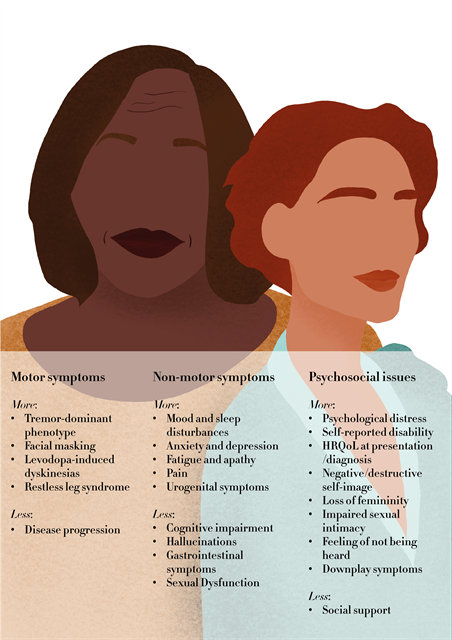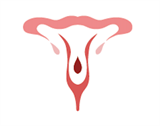 VOLUME 26, ISSUE 1 • March 2022. Full issue »
VOLUME 26, ISSUE 1 • March 2022. Full issue »

A “Call to Action” for Women Living with Parkinson’s Disease
Share this article: Tweet
In January 2022, the Movement Disorders journal published the paper “Unmet Needs of Women Living with Parkinson’s Disease: Gaps and Controversies”1. Although the paper is authored by me, as well as Soania Mathur MD, Annelien Oosterbaan MD, PhD, Richelle Flanagan RD, Adrienne M. Keener MD, and Elena Moro MD, PhD, what makes this paper unique is the inclusion of the voices of three women who are health care providers living with PD as co-authors as well.
What inspired this paper was a virtual support group that I was hosting during the pandemic. I was stunned by how passionate the advocacy was among the women living with PD. I approached Dr. Moro who has been a leader in women’s issues at MDS having just founded the Women in Movement Disorders SIG.
This paper really serves as a call to action to try to improve care for women with Parkinson's disease (WwP) worldwide.
We decided to emphasize the psychosocial aspects and hormonal issues of WwP which have heretofore been neglected. The two figures were created by the daughter of a patient of Dr. Moro. One figure illustrates the new image of PD including two women of diverse ethnic backgrounds and ages. It lists a number of symptoms from the perspective of WwP and helps to guide the reader on what issues are more problematic in women and hence may need more focus. Important issues include more dyskinesias, anxiety, depression, apathy, pain and fatigue in women. From a psychosocial standpoint women had more distress, worse self-image and downplayed symptoms and had less social support than men.

The second figure illustrates the different hormonal stages of WwP and the issues associated with each time point. The representation in visual form of the hormonal changes throughout life and how the issues that can affect quality of life for women at these stages serves as a nice graphic for teaching purposes and to increase disease awareness.
Figure 2:

Menses
- Pre-menstrual worsening of symptoms
- Role of hormonal regulation, contraception
- Young-onset PD — impact on relationships, career, family planning

Pregnancy
- Pre-conception counselling
- Maternal safety and wellbeing
- Teratogenicity of medications
- Guidance around childbirth
- Breastfeeding safety

Perimenopause
- Worsening of symptoms
- Natural menopause vs surgical menopause (hysterectomy with or without oophorectomy)
- Timing and type of HRT (estrogen only vs combined estrogen-progesterone)

Postmenopause
- Role of hormone replacement therapy
- Breast cancer
- Osteopenia/ osteoporosis
- Pelvic floor dysfunction
- Transition in social roles (grandparent, retirement, bereavement)
Important points to highlight include the delay in PD diagnosis, controversy of using Hormone replacement treatment and modulating menses with oral contraceptive pills, and inadequate data on safety in pregnancy for WwP. Under-representation in research and clinical trials, inadequate adoption of complex therapies such as DBS and need for counselling on getting tailored support for WwP is also discussed.
When writing the paper, we were surprised at how little is really known in this important field despite the fact that there has been some discussion of these topics for decades. There is a lot of conflicting data in the literature which makes it very confusing for the individual clinician or WwP. We include a table highlighting the major needs in treatment, research and advocacy for WwP.
We hope this will serve as a starting place for women to speak more about their needs to their family and care team. We also hope that researchers and advocates can use this frame work towards making tangible steps to really making a difference. We have been passionate about spreading the message and have already given a number of support group and academic talks throughout the world, including in Spanish. The reception and support of our entire MDS community has been so heart-warming.
Women living with PD world-wide have really felt heard and seen through this paper for the first time. We thank the MDS and the movement disorders editors for their amazing support and hope to partner with all of you to make a real difference for WwP.
Table 1. Overview of Gaps in Management, Advocacy and Research for Women with PD |
Management:
Psychosocial:
Advocacy:
Increasing engagement of women in research:
Research on:
|
References
-
Subramanian I, Mathur S, Oosterbaan A, Flanagan R, Keener AM, Moro E. Unmet Needs of Women Living with Parkinson's Disease: Gaps and Controversies. Mov Disord. 2022 Jan 20. doi: 10.1002/mds.28921. Epub ahead of print. PMID: 35060180
Share this article:
Related content:
![]() Listen to an interview with Dr. Subramanian about her work on this paper:
Listen to an interview with Dr. Subramanian about her work on this paper:
About the Author
Dr. Indu Subramanian received her medical degree from the University of Toronto, Canada. She did her neurology residency and Movement Disorders fellowship training at UCLA. Dr. Subramanian has stayed on at UCLA and is now a Clinical Professor of Neurology. She established the movement disorder clinic at the West Los Angeles Veterans Administration and has assumed the position of the Director of the South West PADRECC (Parkinson Disease Research, Education and Clinical Care) Center of Excellence in Parkinson Disease. She has developed a strong interest in integrative medicine with a special interest in Yoga and Mindfulness. She underwent a 200 hour yoga teacher training and studied mindfulness at the VA with J.G.Serpa and Christian Wolfe through Insight LA. She is designing a yoga teacher training program for yoga instructors who are interested in working with PD patients. Dr. Subramanian recently got board certified in Integrative medicine. She is also passionate about palliative care in Parkinson Disease. She is doing a contemplative fellowship for health care providers through the New York Zen Center and is an AAN Palatucci Fellow. Dr. Subramanian’s main research interest is on the effects of loneliness on people living with PD.
https://www.parkinson.org/get-involved/my-pd-story/Subramanian
She is the host of a virtual support group with world experts in PD and co-edits a blog for PD patients.
Read more Moving Along:






